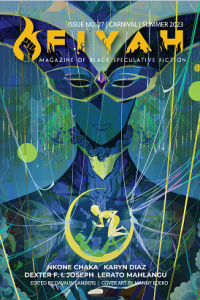Ian Mond Reviews Chercher La Femme by L. Timmel Duchamp
 Chercher La Femme, L. Timmel Duchamp (Aqueduct Press 978-1619761476, $19.00, 320pp, tp) August 2018.
Chercher La Femme, L. Timmel Duchamp (Aqueduct Press 978-1619761476, $19.00, 320pp, tp) August 2018.
L. Timmel Duchamp’s eighth novel, Chercher La Femme, might have been more than 20 years in the making, involving numerous re-writes and multiple critiques, but I can report that the final product justifies the effort.
The book’s premise is simple enough. A rescue mission is sent from Earth to the far-off world of La Femme to recover the surviving crew-members of an expedition that attempted to make first contact with the planet’s inhabitants. The details though are complicated. Firstly, the person commanding the mission is a representative of a socialist utopia called the Pax that has broken away from mainstream society. Secondly, while the Pax are technologically advanced, their ability to travel interstellar distances is a consequence of encountering the Delta Pavonians, a species of intelligent avians who communicate through movement and vocalisation. While a computer can translate the Delta Pavonians, two-way conversation is only achieved by radically altering the vocal cords of select humans, exclusively women. With the ability to speak to the avians, these women – dubbed “word processors” – have the added skill of “singing” a star-ship across space via the process of transudation. Willing to share their technology, the Delta Pavonians provide the Pax with three modified space-craft and the knowledge of a second alien species residing on the planet La Femme in the Albireo system. This circles us back to the premise – the first ship that reached La Femme never returned. A final message though was transmitted by the Captain, Paul 22423, warning the Pax from sending anyone who identified as female because “transudation poses a clear danger to female humans that must in future be avoided.”
Ignoring Paul’s dire warning, the Pax launch an all-female crew to La Femme headed by one of their best diplomats, Julia 9561. When the novel opens, the ship’s AI has woken Julia from the comfortable confines of her virtual world into the unpleasant physicality of “meat-space” where she discovers that in her absence an almost mutiny led to the death of a science officer. As Paul forewarned, those not safely ensconced in a virtual environment were affected by transudation. With the threat of revolution in the air, Julia must manage her team while also establishing first contact with an alien species that challenges her rigid beliefs and her sense of self.
Chercher La Femme is a very chatty novel, with Julia holding frequent discussions both in virtual and meat-space with her crew. As someone who owns a mug that says “I just survived a meeting that could have been an email” I’d typically find these scenes, heavy with exposition, tedious. However, Duchamp uses these interactions to heighten tension, especially the fraught relationship between Julia and the ship’s psychologist Fuyuko, which becomes all the more strained when the La Femme suddenly appear on-board the ship, wearing the faces of loved ones back on Earth. The interactions also illustrate Julia’s growth as a leader, assisted by virtual copies of herself to observe and offer advice on how best to respond to the crew. I found myself looking forward to these meetings, fascinated to see how Julia would navigate the demands of the crew, the mission objectives and the creepy nature of the La Femme.
It’s not all about meetings though; alternate chapters chart Julia’s upbringing as a member of the Pax. It’s here that Duchamp explores how the Pax, who are progressive when it comes to gender, sexuality and the division of labour, deal with powerful emotions like desire. As Julia notes at one point, “desire [is] a positive force, the engine that [makes] things happen,” but that it also “generated spurious needs that were basically destructive to life”. This, she believes, is the reason the Pax struggle to communicate with Outsiders (i.e. everyone else). However, Julia’s views on desire are tested when her daughter refuses to kowtow to the expectations of the family, preferring to become a word processor – a mediator between Delta Pavonians and humans – rather than live in the virtual worlds of the Pax. When she confronts the La Femme, a species – and I’m skipping around spoilers here – fuelled by desire, Julia is again pushed to reflect on what she truly believes. These moments of introspection are the emotional life-blood of the book.
While the story does stumble when the true nature of the La Femme is revealed – a little too Star Trek: The Next Generation for my tastes – Chercher La Femme remains a novel that incorporates many of the best aspects of science fiction – a sense of wonder, an exploration of the self, a coming to terms with the alien – woven together with a great deal of intelligence, sympathy and insight.
This review and more like it in the October 2018 issue of Locus.
 While you are here, please take a moment to support Locus with a one-time or recurring donation. We rely on reader donations to keep the magazine and site going, and would like to keep the site paywall free, but WE NEED YOUR FINANCIAL SUPPORT to continue quality coverage of the science fiction and fantasy field.
While you are here, please take a moment to support Locus with a one-time or recurring donation. We rely on reader donations to keep the magazine and site going, and would like to keep the site paywall free, but WE NEED YOUR FINANCIAL SUPPORT to continue quality coverage of the science fiction and fantasy field.







